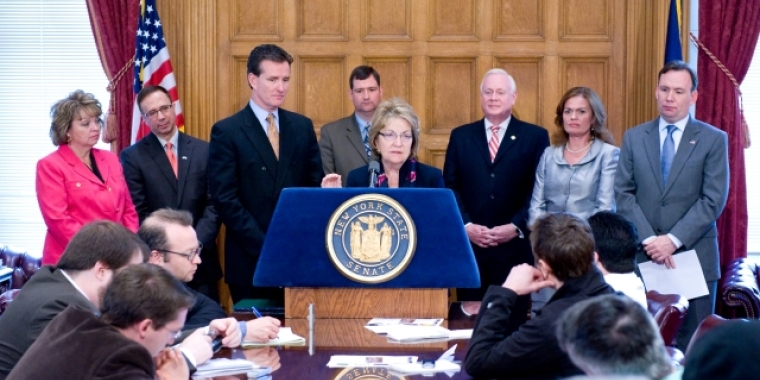
Senate Passes Bill to Criminalize Synthetic Marijuana
Betty Little
May 1, 2012
-
ISSUE:
- Crime

SENATE PASSES BILL TO CRIMINALIZE SYNTHETIC MARIJUANA
The New York State Senate passed legislation on Monday, April 30 to criminalize the sale and possession of synthetic marijuana. The bill (S.6694), sponsored by Senators John Flanagan and Betty Little, would also criminalize the sale and possession of hallucinogenic chemicals deceptively called “bath salts.”
“These ‘legal’ drugs clearly have the potential to do harm to our residents, and serve as gateways to further and more devastating drug use. While we applaud Governor Cuomo’s ban, we need to take additional action to get these substances completely out of our communities and out of the reach of our young people. Drug abuse is a pervasive problem impacting a growing number of families across our state. We owe it to our children and their parents to make sure that we get this legislation enacted this year,” stated Senator Flanagan.
“These chemicals are just as dangerous as illegal drugs, and maybe more so because of how readily available they are to children and teens,” Senate Majority Leader Dean G. Skelos said. “We are taking an important step in protecting the health and safety of our communities by banning the sale and possession of synthetic marijuana and bath salts.”
Synthetic marijuana or “fake pot” are herbs sprayed with chemicals called “synthetic cannabinoids.” These products -- including Spice, K2, Cloud 9 and Black 9 -- have dangerous side effects, including rapid heart rate, tremors, loss of consciousness and hallucinations. “Bath salts,” or “substituted cathinones,” are chemically related to methamphetamines and ecstasy and also cause harmful physical and psychological impacts.
In addition to potential health risks facing those who use the chemicals, the use of synthetic marijuana and “bath salts” has also been implicated in serious criminal activity. Just last week, Richard A. “Psycho” Velazquez was sentenced to 10 years in state prison and 5 years on parole for his guilty plea to felony counts of assault and strangulation in an attack on a woman and her infant child in Glens Falls, Warren County. Velazquez slammed the victim’s face into a mirror, choked her and tackled her down a flight of stairs as she held her 7-week-old child. He admitted that the synthetic marijuana product he had been smoking directly contributed to his actions.
While Governor Andrew Cuomo signed a law to ban the sale of “bath salts” last year, and just last month the New York State Department of Health banned the sale and distribution of synthetic marijuana through an Order for Summary Action, possession of these substances -- which may be purchased outside the state or via the Internet -- continues to be legal.
To address this issue, the legislation goes a step further and criminalizes the possession of these products. Under the provisions of this bill, penalties for the sale and possession of synthetic marijuana and bath salts would be similar to those for marijuana and methamphetamines, respectively. Therefore, sale of these substances to a minor, or on or near school grounds, would constitute a class B felony punishable by up to 25 years in prison.
Senator Joseph A. Griffo (R-C-I, Rome) said, “Last year, I was pleased when the Governor gave final approval to legislation that I sponsored to ban the sale, manufacturing, possession and distribution of deceptively-labeled, hallucinogenic 'bath salts' in New York State. Unfortunately, law enforcement and health professionals identified synthetic marijuana as a health emergency requiring immediate action or we could see a rise in tragic consequences if it's not addressed. We hope that the Assembly and the Administration acts again with the same expediency that we displayed last year. No one doubts that lives are at risk.”
“Despite the Department of Health’s ban, enforcement actions by local police and even a crackdown by the Army to keep these dangerous products out of the hands of young soldiers, people are still finding ways to obtain and use them,” said Senator Patty Ritchie (R-C, Heuvelton). “By criminalizing the sale and possession of synthetic marijuana we can ensure people across the state, especially the young people these products are targeted to, don’t suffer the proven, serious side effects of their use.”
In addition to outlawing the sale and possession of synthetic marijuana and bath salts, this legislation would establish a Statewide Synthetic Cannabinoid and Substituted Cathinone Surrender Program. For 90 days following the effective date of the law, the program would allow individuals to voluntarily turn over any products containing synthetic cannabinoids and substituted cathinones at locations throughout the State.
A state database would also be created and available on the New York State Department of Health’s website to provide retailers, law enforcement and the general public with a listing of trade names, physical descriptions, brand names and images of the various products known to be either synthetic marijuana or “bath salts.”
Warren County District Attorney Kate Hogan said, “If anyone has a doubt about the impact of synthetic marijuana, they need only look at the cases we are seeing in the court system where the defendant was under the influence of the drug. Case after case, we see otherwise non-violent people committing horrific acts, such as the 18-year-old who stabbed his mother repeatedly, leaving her without any use of her right hand. To ban the sale of such a dangerous drug is a great first step, but does not go far enough. I commend the Senate for outlawing the possession of synthetic marijuana and urge the Assembly not to hesitate in following suit. The safety of New Yorkers is too important.”
“I applaud Senator Little, and the efforts of our state legislators, for introducing a bill to ban synthetic marijuana and criminalize the sale and possession of herbal incense products,” said Washington-Saratoga-Warren-Hamilton-Essex BOCES District Superintendent James Dexter. “We see the effects of fake weed on our young people in our schools more and more frequently, and it’s not good. Students who use fake weed can’t learn – they’re agitated, aggressive, paranoid, and unmanageable. We are finding that these behaviors accelerate the more students use the drug, and their bodies are not returning to normal. Several young people have been sent to the Emergency Room, the police station, and home on suspension as a result of using synthetic marijuana at school.”
“Fake pot has real health consequences, as do bath salts and other products that are aggressively being marketed to young people on Long Island and around the State. Several journal articles published in the last three months have detailed a wide range of psychiatric symptoms experienced by users including paranoia, hallucinations, delusions and extreme anxiety. Several other journal articles have detailed cases of convulsions, heart attacks and kidney failure in adolescents who, because these substances are legal, often mistakenly believe they are safe. We thank Senators Flanagan and Little for leading the charge to protect our State's young people, and we continue to urge the Assembly and our Governor to follow suit,” added Dr. Jeffrey Reynolds, Executive Director of the Long Island Council on Alcoholism and Drug Dependence.
####
"I’ve heard from parents, educators, substance abuse counselors and all of my district attorneys urging the state Legislature to make the sale and possession of these drugs illegal,” said Senator Betty Little (R-C-I, Queensbury). “But the most compelling pleas have come from teenagers who have used or seen someone use these drugs. The effects are so alarming that they’ve asked me to do something. That says a lot about just how deceptively dangerous these drugs are and why it is important we act today and that the Assembly joins us in this effort.”
Share this Article or Press Release
Newsroom
Go to NewsroomBusiness leaders outline concerns on doing business in New York
September 24, 2009
AMC holds ceremony for new Tupper Lake buildings
September 23, 2009
EDITORIAL: Community college merger unwise
September 23, 2009